what is the best type of oil to use in a 30 hp briggs engine

Have you ever really thought well-nigh the differences in how your boat's engine is used compared to your automobile's engine? Do you know why it'due south important to understand these differences, so you lot can cull the all-time oil? This commodity will talk to yous well-nigh some of these differences and introduce you to the all-time synthetic motor oils on the marine market, manufactured by AMSOIL.
Download a Mill Catalog
What'south different
The moisture and sometimes salty environment it operates in, the amount of apply it gets, high RPM'southward and constant load are only a few. Compared to your automobile'southward engine, these are some of the harshest environments that can be encountered. Add to this listing, that maintenance is normally not at the meridian of the priority list. So, when you choose an oil for your boats engine, using one that is designed to give you the best protections in those conditions is a must.
Whats high stress
Consider that a marine engine powering a boat at 30 mph runs about five,000 rpm. In dissimilarity, an automotive engine powering a car at 60 mph runs almost 2,000 rpm. This college stress causes traditional oils to break downwardly and lose viscosity. This leads to eolith formation, reduced power and eventually engine failure.
How does rust come into play
Due to constant exposure to humid, wet environments, marine engines are prone to rust and corrosion. Rust on engine parts acts like sandpaper, scouring bearings, the cylinder wall, piston rings and other components, while aluminum pistons and other parts can corrode. Rust and corrosion reduce engine power and eventually crusade catastrophic failure. Rust protection is not natural to motor oil; it comes only past design from the additives added to it.
Storage
When a marine engine sits in storage for the winter season, all the acids and water introduce to the oils tin lead to rust formation on the internal parts. When the engine starts up again, damage will acquired to the cylinders and bearings. Extending your rust protection to the off season comes into play.
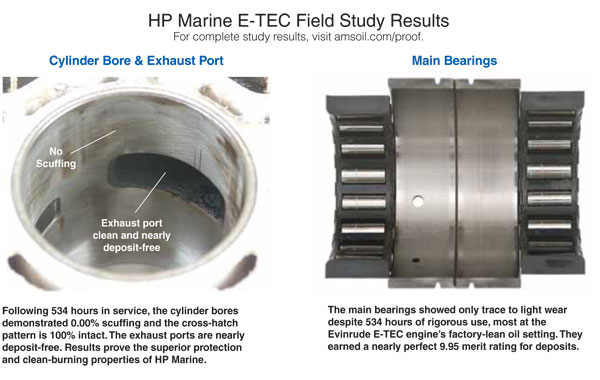
Who makes oils
Reading a recent article most marine engine oils, I had to laugh when the author started talking about engine makers formulating oils. Engine makers don't formulate motor oils, the oil industry's formulate oils. Only as designing engines to meet the newest standards is a continuous process with lots engineering and testing, Formulating oil to meet the latest standards in a multifariousness of operating environments takes the same amount of technology and testing. On top of all that goes into developing oils, testing oils is expensive and ongoing. Most people don't understand that every time and oil formulation is adapted, information technology must go through the tests all over agin to be re-certified.
Who makes the standards
The National Marine Manufacturers Association (NMMA) developed the standards and testing procedures for certification for Marine Engine Oils. These certifications are FC-W, FC-W (True cat) and the TC-W3. The goal of these oil certifications is to reduce emissions, increase fuel mileage and pattern oils specifically for the marine surroundings.
Here is a link to the NMMA if you want to read more than about them.
FC-W and FC-W (True cat)
These oils are designed for the 4 stroke marine engines existence produced. The FC-W (CAT) category is for the newest marine engine technology that has exhaust later on treatments to further reduce emissions. These FC-W (CAT) oils are catalyst compatible.
Four Stroke Marine Oil Certification Testing
Who develops the tests and what are they testing for? Straight from the NMMA site: "Working with the NMMA, industry leaders in lubrication technology developed testing criteria for this marine four-stroke oil. These criteria include bench tests for viscosity, corrosion, filter plugging, foaming and aeration. In addition, the oil must successfully pass a 100-hour general performance engine test."
The FC-W (CAT) certification takes into account the demand to protect the catalyst in marine engines with frazzle after-treatments in addition to all the normal performance criteria of the FC-W oils.
TC-W3
Two stoke oils lubricates engine parts as information technology passes through the engine and is burned off with the fuel. Two stoke oils tin can be either mixed with fuel or injected in to the combustion chamber with the fuel. The long term goals for two stroke engines have been to reduce the amount of oil used in mixes and to reduce the corporeality of emissions containing the unburnt oil while increasing engine life.
As 2 stroke engines keep to move to higher cylinder temperatures and increased compression ratios to improve functioning, it'due south critical to utilize oils that meet TC-W3 specs.
How are TC-W3 oils tested
From the NMMA, "The TC-W3® oil standard is a performance-based qualification programme. The requirements include various demote tests for fluidity, miscibility, rust, compatibility, etc., as well as engine tests to evaluate the prevention of ring sticking and carbon buildup on pistons and other engine parts. The engine tests include i Johnson 40 hp and 2 consecutive Mercury 15 hp tests, all of which are run nether astringent conditions for 100 hours each. Two additional engine tests are also conducted to ensure a high level of lubricity performance."
Why is this important
These specific tests and criteria are needed because of the high loads, high speed, exposure to high levels of humidity and salt water found with marine engines. Most standard oil tests don't work for these conditions. So tests for oils specific for the marine environs are of import for the current and future development of marine oils.
Why use AMSOIL marine motor oils
AMSOIL is known equally the leader in the Synthetic Motor oils. They have been developing, producing and pushing the limits of synthetic motor oils for over 45 years. They take their research and real world data from their involvement in automotive, racing, marine and other industries to ameliorate all their products. At present, AMSOIL also has research from one of the most demanding industries, Wind Turbine gear box oil, to add to their line up. In addition to all the testing for API/NMMA and other industry certifications, AMSOIL has contained lab testing and conducts existent earth field studies of its products in use. They and then publish the results of these studies for everyone to read.
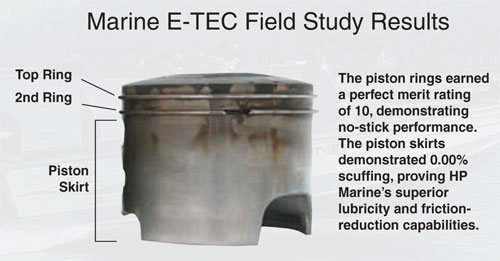
Why this matters to you the marine engine owner
AMSOIL is the Factory Fill in over l% of the gear boxes world wide for wind turbines. When one of these gear boxes fail, it costs over $500,000 to repair or replace. AMSOIL has had such great success in this market with reducing failures, that they are in talks to increase the number of factory fills they do. What this does is gives AMSOIL amazing enquiry and data, in one of the most demanding operating environments, to apply to the other oils they manufacture for other industries. The harsh operating environments of marine engines being one of those other industries.
What marine oils are available from AMSOIL
For Four Stroke Marine Engines AMSOIL has Synthetic marine oils that provide the highest wear protection and neat rust prevention for the loftier stress, high RPM and wet atmospheric condition of marine engines. These protections last well into the storage flavour was well.
AMSOIL 10W-30 Synthetic Marine Engine Oil
NMMA FC-W (Cat) Certified
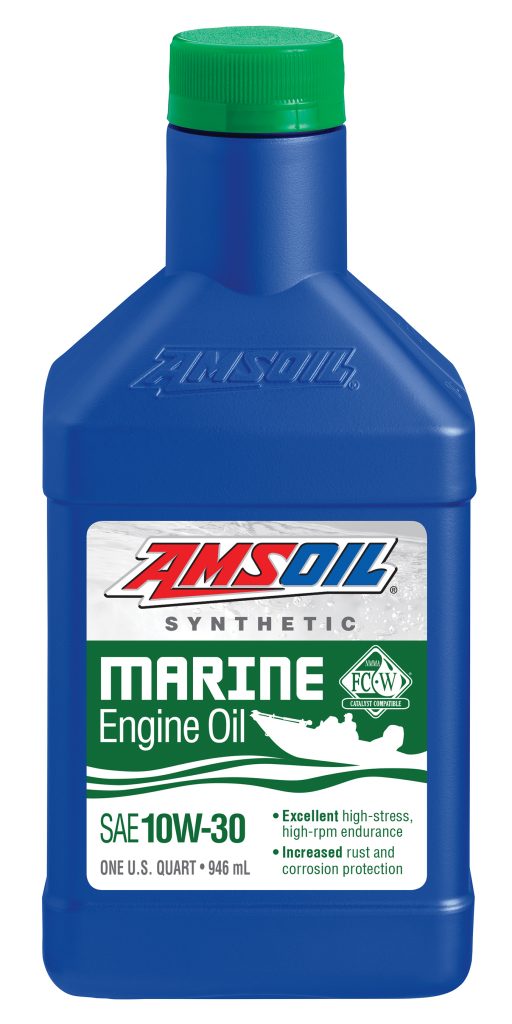
Is a premium synthetic formulation designed to withstand the heat and stress of high-rpm operation and deliver excellent wear protection. Information technology protects against rust and corrosion during periods of inactivity and long-term storage to keep your engine protected, even when it's non running.
Applications include: Gasoline-fueled iv-stroke inboards, outboards, inboard/outboards and personal watercraft, including those made past Honda*, Mercury*, Yamaha*, Johnson/Evinrude*, Bombardier/BRP*, Suzuki*, Nissan*, Tohatsu*, OMC*, Volvo-Penta*, Mercruiser*, Chevrolet* and Ford*.
Buy 10-W30 Marine engine oil here
AMSOIL 10W-twoscore Synthetic Marine Engine Oil
NMMA FC-W (Cat) Certified
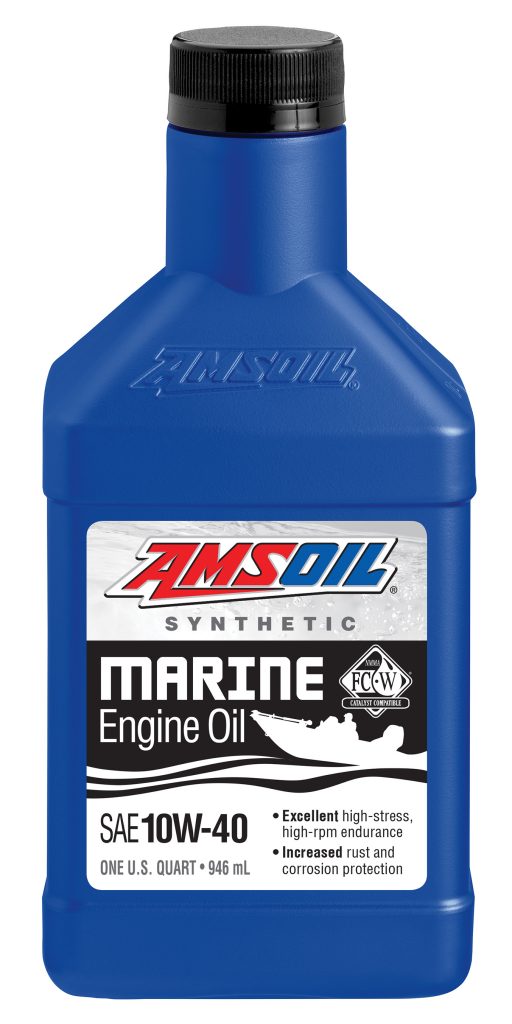
Is a premium constructed formulation designed to withstand the heat and stress of high-rpm functioning and deliver excellent wear protection. Information technology protects against rust and corrosion during periods of inactivity and long-term storage to keep your engine protected, even when it's non running.
Applications include: Gasoline-fueled four-stroke inboards, outboards, inboard/outboards and personal watercraft, including those made by Honda*, Mercury*, Yamaha*, Johnson/Evinrude*, Bombardier/BRP*, Suzuki*, Nissan*, Tohatsu*, OMC*, Volvo-Penta*, Mercruiser*, Chevrolet* and Ford*.
Buy 10W-40 Marine engine oil here
25W-40 Constructed Blend Marine Engine Oil
FC-W (True cat)® Certified
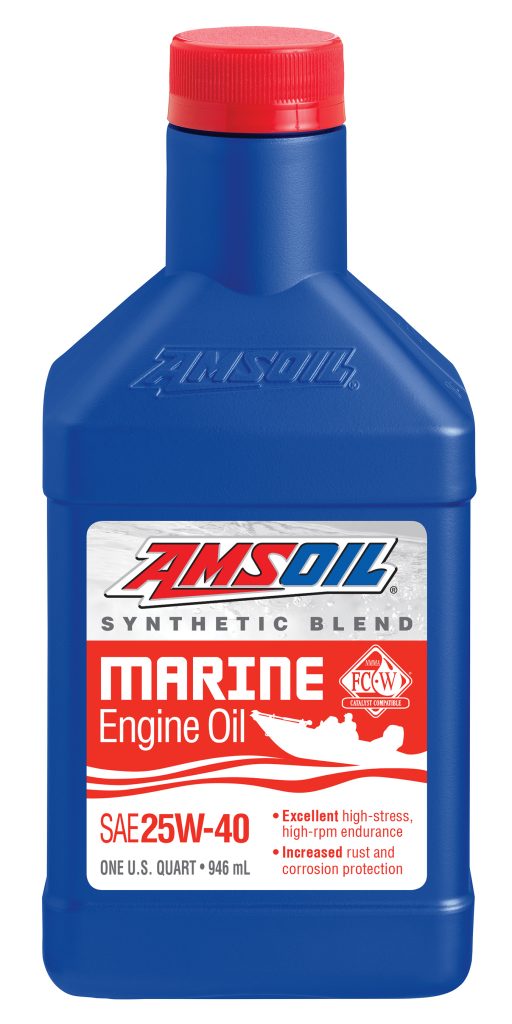
Is designed with splendid shear stability to deliver a consequent lubricating film. It helps guard engine components from wear for maximum life. It is fortified with strong inhibitors that guard confronting dissentious rust and corrosion.
Applications : Apply in gasoline-fueled four-stroke inboards, outboards, stern-drives (inboard/outboards) and PWC that require whatever of the specifications, including those made by Mercury* and Mercruiser*.
Buy 25-W40 Marine engine oil hither
For 2 stroke equipment
AMSOIL Specifically designed for outboard motors, two-Stroke Oil containing a heavy dose of low-temperature dispersant additives that excel at reducing varnish, carbon and deposit formation in water-cooled motors. They have low-smoke, low-odor, depression-toxicity backdrop that produce fewer emissions, thus benefitting operators and the environment.
Outboard 100:i Pre-Mix Synthetic 2-Stroke Oil
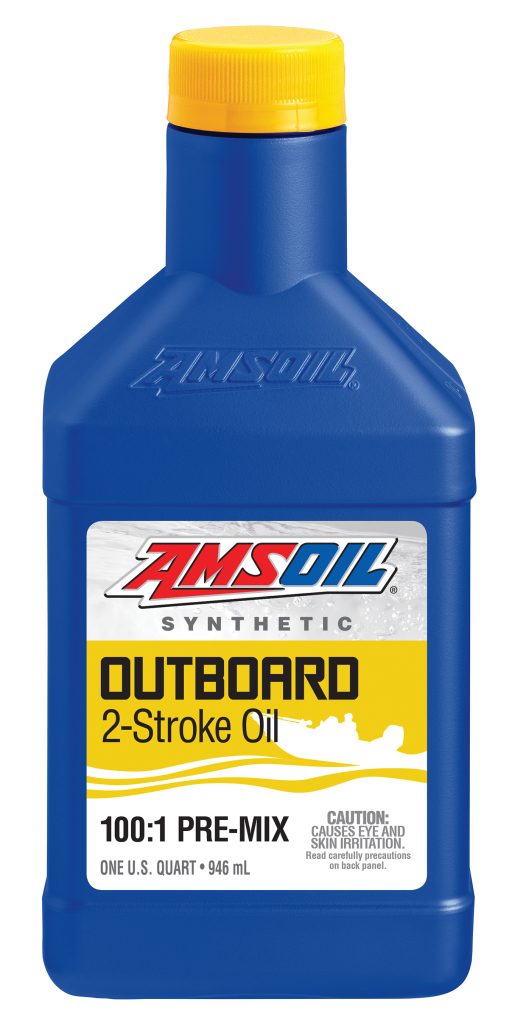
Designed for pre-mix applications as lean as 100:1 ratios or richer. Improves throttle response and lowers or eliminates smoke. Minimizes deposit formation and lowers emissions. Performance emphasis on the cooler operations of water-cooled motors.
Applications include: pre-mix use in two-stroke outboard motors, personal watercraft and jet boats that specify TC-W3. For maximum operation, mix with gasoline at 100:1 regardless of the mix ratio specified for the equipment. Richer mix ratios may be used where desired.
Purchase Outboard 100:ane Pre-Mix Constructed 2-Stroke Oil here
HP Marine Synthetic two-Stroke Oil
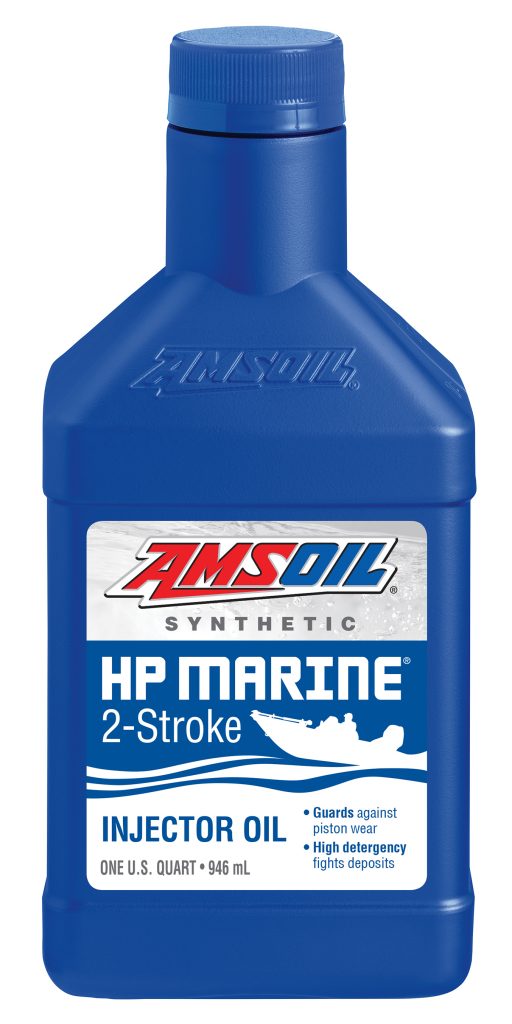
Excellent for Evinrude® Eastward-TEC™ mill-lean setting (replaces Evinrude XD100™ 2-Bike Oil). Helps prevent deposits, protects against article of clothing, has low fume, protects against rust and has low aquatic toxicity. Superior operation as an injection oil or at 50:1 pre-mix.
Applications include: Utilize in ii-stroke marine applications that specify TC-W3, including those made by: Johnson/Evinrude*, FICHT*, East-TEC*, Mercury* EFI & Optimax*, Yamaha*, Nissan*, Tohatsu* TLDI*, Suzuki*, Mariner*, Force*. Utilise every bit injection oil or 50:ane premix (2.6 oz. per U.South. gallon of gas).
Buy HP Marine Synthetic 2-Stroke Oil here
As you lot can see AMSOIL, who has been a leader in all markets of constructed motor oils, makes products for all manufacturers of ii stroke and four stroke marine engines. These oils give you the best wear protection, rust prevention and longest lasting engines in the marine environment. All of these oils are backed by AMSOIL'due south industry leading warranty.
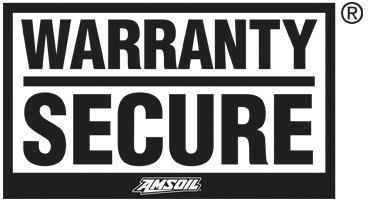
Yous can too save upward to 25% as a preferred customer.
Download a full production catalog
Learn more about all AMSOIL synthetic oil products
Check u.s.a. out at the Synthetic Oil Depot
***We remind you lot that it's a violation of U.s. Federal constabulary for boat, engine and other power sport manufacturer's to void your warranty or threaten your warranty for using the products you choose to apply.
Source: https://synthetic-oildepot.com/best-motor-oil-for-your-boats-engine/
0 Response to "what is the best type of oil to use in a 30 hp briggs engine"
Post a Comment